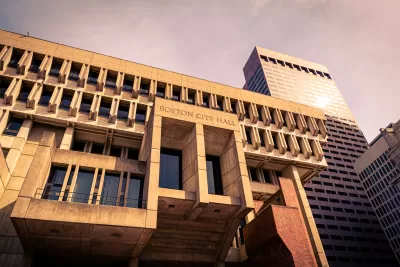Mayor Michelle Wu said the new rule will help boost demand for green materials and create new jobs in the green building sector.

An executive order signed by Boston Mayor Michelle Wu bans the use of fossil fuels in new buildings and renovations of city-owned property, reports Nish Amarnath in Smart Cities Dive. “Wu said the move will accelerate Boston’s goal of achieving carbon neutrality by 2050, with buildings accounting for more than 70% of the city’s total carbon emissions, and municipal emissions constituting 2.3% of all those emissions.”
The move could boost demand for low-emissions products and materials. “Wu’s office added that the executive order will pave the way for fresh employment prospects in building construction, design and maintenance.”
The rule applies to city properties, but also includes “a significant rule alteration regarding fossil fuel use in private projects.” Last month, Mayor Wu announced “a specialized climate-friendly state-specific stretch code that mandates new constructions, even those currently using natural gas, to be equipped for future all-electric functionality” that will go into effect in January 2024.
FULL STORY: Boston mayor bans fossil fuels in new city-owned buildings

Alabama: Trump Terminates Settlements for Black Communities Harmed By Raw Sewage
Trump deemed the landmark civil rights agreement “illegal DEI and environmental justice policy.”

Planetizen Federal Action Tracker
A weekly monitor of how Trump’s orders and actions are impacting planners and planning in America.

The 120 Year Old Tiny Home Villages That Sheltered San Francisco’s Earthquake Refugees
More than a century ago, San Francisco mobilized to house thousands of residents displaced by the 1906 earthquake. Could their strategy offer a model for the present?

In Both Crashes and Crime, Public Transportation is Far Safer than Driving
Contrary to popular assumptions, public transportation has far lower crash and crime rates than automobile travel. For safer communities, improve and encourage transit travel.

Report: Zoning Reforms Should Complement Nashville’s Ambitious Transit Plan
Without reform, restrictive zoning codes will limit the impact of the city’s planned transit expansion and could exclude some of the residents who depend on transit the most.

Judge Orders Release of Frozen IRA, IIJA Funding
The decision is a victory for environmental groups who charged that freezing funds for critical infrastructure and disaster response programs caused “real and irreparable harm” to communities.
Urban Design for Planners 1: Software Tools
This six-course series explores essential urban design concepts using open source software and equips planners with the tools they need to participate fully in the urban design process.
Planning for Universal Design
Learn the tools for implementing Universal Design in planning regulations.
Clanton & Associates, Inc.
Jessamine County Fiscal Court
Institute for Housing and Urban Development Studies (IHS)
City of Grandview
Harvard GSD Executive Education
Toledo-Lucas County Plan Commissions
Salt Lake City
NYU Wagner Graduate School of Public Service





























